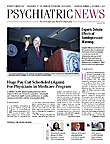One thing that was clear from the beginning of the AIDS epidemic was that the disease produced significant neuropsychiatric effects, Marshall Forstein, M.D., an associate professor of psychiatry at Harvard Medical School, told Psychiatric News recently. Forstein was still in psychiatric residency at Massachusetts General Hospital when he was among the first physicians in the Boston area to see an AIDS patient.
“On initial physical exams, 20 percent of AIDS patients presented with dementia,” he said, recalling those early years on the occasion of World AIDS Day 2014, December 1. “Many would also develop depression, anxiety, or suicidality, and so I thought that APA had to play a significant role in the response to the growing epidemic.”
He went to the 1981 APA annual meeting and joined with several of his colleagues to urge creation of a task force on HIV and psychiatry. Over the 33 years since, the task force evolved into a formal committee that worked to confront clinicians’ anxiety about the disease, address prevention issues, and create policies on HIV testing and counseling.
In 1991, APA President Lawrence Hartmann, M.D., appointed Forstein chair of APA’s Commission on AIDS, a post he held for a dozen years. During that time, APA and other mental health organizations received federal grants to educate their members about HIV and AIDS.
“We sought to train psychiatrists already in practice, residents, and nonmedical providers about the cognitive and psychiatric effects of AIDS,” said Forstein. “To date, at least 19,000 people have attended trainings at APA meetings.”
That training and educational function has been continued and supported by APA’s Office of HIV/AIDS Psychiatry, an office now undergoing a reevaluation following a reduction in grant support from the Substance Abuse and Mental Health Services Administration, said APA CEO and Medical Director Saul Levin, M.D., M.P.A.
“The APA committee within the Office of HIV/AIDS Psychiatry will review what has been done in the past and build on those efforts to be even more effective in research, education, and diversity,” said Levin. “It is important not to lose sight of the mental health aspects of the disease.”
The development of triple antiviral therapy in 1995 would create another role for psychiatrists, helping patients adhere to complex regimens of 15 to 20 pills a day. But medication doesn’t halt cognitive impairments in a subset of patients, especially as they age, so they require continued care to remain in treatment and take precautions against infecting others.
The complexity of the disease is compounded by its context, which affects nearly every aspect of mental life and function, Forstein said last year in the Journal of Gay and Lesbian Mental Health. “A behaviorally fostered epidemic can be met only with understanding and treating the underlying social, psychological, and political underpinnings of sexual behavior, substance abuse, and marginalization,” he explained.
As for the present, Forstein said that continuing efforts at prevention and care must be sustained, especially with communities in which there is a high risk of people becoming infected with HIV. Those include many individuals and groups already stigmatized by society, not only sexual minorities but also intravenous drug users, African Americans, and other racial and ethnic minorities, he said. ■
APA has posted information about HIV and AIDS
here.

